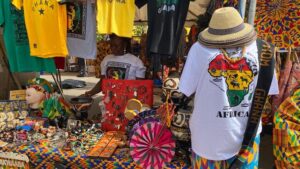By Juliet Aguiar DUGBARTEY, Takoradi
The Ghana National Chamber of Commerce and Industry (GNCCI), Sekondi-Takoradi Branch, has ended the 3rd edition of trade and business exhibition fair, dubbed ‘Chamber Bazaar’, in Takoradi.
The Chamber Bazaar, which started on March 23 – April 1, 2024, was on the theme ‘Exploring the Impact of Made-in-Ghana Products on Economic Growth and Resilience’.
The business fair assisted local businesses in the region to showcase their products and services and presented an opportunity for local entrepreneurs to network, gain valuable exposure and access potential customers for future business relationships.
Dr. Clement Osei Amoako, President of GNCCI, in an address read for him by Stephane Miezan, 2nd Vice President of GNCCI, explained that the Chamber Bazaar is a nationwide initiative that served as a platform for showcasing the vibrant entrepreneurial spirit and economic resilience in Ghana.
“Since its inception in 2022, this event has steadily grown in significance, highlighting the ingenuity and creativity of our local businesses across all regional branches of the Chamber. Our presence here for the next 10 days is clear: to promote and showcase at least 80 percent of Made-in-Ghana goods and services,” he said.

He pointed out: “As citizens, we all share a responsibility to embrace and promote Made-in-Ghana goods. In essence, supporting local businesses and choosing locally produced goods and services enhances Ghana’s export capacity, contributing not only to our economic prosperity but also to the resilience and sustainability of our beloved nation”.
Therefore, Dr. Amoako was hopeful that the exhibitors have been able to seize the opportunity presented at the Chamber Bazaar to expand their market reach and strengthen their businesses.
Kwabena Okyere Darko-Mensah, Western Regional Minister, noted that in recent years, the country has witnessed a remarkable surge in the production and consumption of Made-in-Ghana products.
“From textiles to technology, from agriculture to artisanal crafts, our entrepreneurs and artisans are demonstrating exceptional skill and creativity, producing goods that rival the best on the global market,” he said.
However, he said the significance of this growth extends far beyond mere economic statistics. The impact of supporting local industries goes to the very core of our national identity and sovereignty.
“When we choose Made-in-Ghana products, we are not just purchasing goods; we are investing in the future of our nation. We are creating jobs, empowering local communities and fostering a sense of pride and ownership in our collective destiny,” he added.
He said: “For Ghanaian businesses to compete favourably with their international counterparts, we must consider adding value, which is an essential component of global trade. There is a need for us to adopt value chain addition to achieve innovation in our quest for global acceptance”.
Mr. Darko-Mensah commended the GNCCI, saying: “Your commitment to promoting trade and industry and the passion with which you represent the business community on matters affecting trade and industry is highly commendable”.
“I also want to commend the dedication and sacrifices of our entrepreneurs who persevered through unexpected business challenges, making substantial adjustments to their business models to ensure survival and the economic growth of our nation,” he said.
Isaac Yankson, Western Regional Trade Officer, Ministry of Trade and Industry (MoTI), encouraged SMEs to ensure that their products are of good quality and standard to be able to participate in the African Continental Free Trade.
According to him, Made-in-Ghana products are very significant and pave way for export market. “So, be competitive and ready for the export market at all times”.










